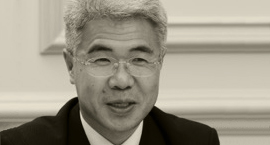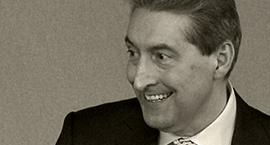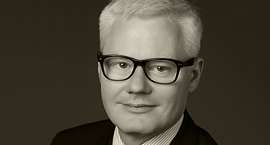
During the "Advances in Intravascular imaging" course in London, Simple Education, in association with Radcliffe Cardiology, filmed a roundtable discussion focusing on the topical area of 'The role of IVUS in Contemporary PCI'.
This discussion was moderated by Dr Andrew Sharp (Exeter, UK) who was joined by an expert group of physicians including Prof Takashi Akasaka (Wakayama, Japan), Prof Carlo di Mario (Florence, Italy), Prof Jacek Legutko (Krakow, Poland) and Dr Peter O'Kane (Bournemouth, UK).
The meeting comprised of three panel discussions on a range of topical issues related to all aspects of IVUS Imaging.

Dr Andrew Sharp is a Consultant Interventional Cardiologist, working at the Royal Devon and Exeter Hospital in South West England. His interests include coronary physiology, renal denervation, intra-coronary imaging, complex PCI and hypertension. He trained in Edinburgh, London and Milan, under the tutelage of Professor Antonio Colombo and leads an active research program, as an honorary senior lecturer at Exeter University.

Prof Takashi Akasaka graduated from Wakayama Medical University in 1982 and finished his residency at Kobe City Medical Center General Hospital. He was a clinical fellow at Harefield Hospital in the United Kingdom in 1987. Since 1989, he had done clinical research work in the field of coronary physiology using echocardiography, pressure wire and flow wire extensively at Kobe City Medical Center General Hospital as a director of cardiac catheterization laboratory for 8 years. After he moved to Kawasaki Medical School as an associate professor, he started OCT in addition to coronary physiology in 1999. He became Professor of Wakayama Medical University in 2005 and he has been devoted to the clinical research work using OCT. He has published many papers regarding the pathophysiology of ACS or DES healing process using OCT in collaboration with his colleagues in addition to coronary physiology research. Based on his clinical and research work, he has been an executive board member in various cardiology societies and a course co- director of several coronary live-demonstration courses in the world.
 Prof Carlo Di Mario is currently Professor of Clinical Cardiology, NHLI, Imperial College of Sciences, Medicine & Technology, London. He is theme leader of the area Complex Coronary Artery Disease of the Cardiovascular Biomedical Research Unit of the Royal Brompton & Harefield Foundation Trust. He was appointed in 2010 Senior Investigator of the National Institute of Health Research. He maintains an active clinical involvement having performed more than 200 PCI per year in the last 10 years in London with the special interest in the treatment of chronic total occlusions, bifurcations, calcified lesions and diffuse disease. He is a regular TAVI operator and certified implanter for the Medtronic CoreValve and Edwards Sapien transcatheter aortic valves. In 2014 he successfully led a bid for the commissioning of MitraClip in his hospital (40/year for 3 years, worth £3.6 million only for the devices). He holds an NHS Bronze National Award. Professor Di Mario pioneered the use of intracoronary Doppler, pressure measurement, ultrasound and optical coherence tomography. These techniques have become the gold standard for physiological assessment of lesion severity and have revolutionised the technique of stent implantation with the use of high pressure dilatation which led to the universal application of this method in interventional cardiology. Professor Di Mario is now applying these intravascular techniques for the guidance of implantation of fully bioabsorbable stents and optimal stent apposition across bifurcations and in complex lesions. He has led or participated in studies and trials to improve technical success of recanalisation of chronic total occlusion and demonstrate its clinical usefulness. He cooperated with Dr J. Davies to the development of the concept of iFR to facilitate assessment of lesion severity and discriminate the contribution of individual lesions, and with Dr A Lyon to the intracoronary delivery of SERCA-2 genes via adenoviral vectors in the CUPID2 trial. Prof Di Mario was Principal Investigator of the CARESS in AMI trial, a large multicentre trial showing that patients who receive fibrinolytic therapy for ST-elevation myocardial infarction benefit from early angioplasty. This trial and a subsequent meta-analysis have led to a change in the European Society of Cardiology and AHA/ACC Guidelines for treatment of STEMI patients.
Prof Carlo Di Mario is currently Professor of Clinical Cardiology, NHLI, Imperial College of Sciences, Medicine & Technology, London. He is theme leader of the area Complex Coronary Artery Disease of the Cardiovascular Biomedical Research Unit of the Royal Brompton & Harefield Foundation Trust. He was appointed in 2010 Senior Investigator of the National Institute of Health Research. He maintains an active clinical involvement having performed more than 200 PCI per year in the last 10 years in London with the special interest in the treatment of chronic total occlusions, bifurcations, calcified lesions and diffuse disease. He is a regular TAVI operator and certified implanter for the Medtronic CoreValve and Edwards Sapien transcatheter aortic valves. In 2014 he successfully led a bid for the commissioning of MitraClip in his hospital (40/year for 3 years, worth £3.6 million only for the devices). He holds an NHS Bronze National Award. Professor Di Mario pioneered the use of intracoronary Doppler, pressure measurement, ultrasound and optical coherence tomography. These techniques have become the gold standard for physiological assessment of lesion severity and have revolutionised the technique of stent implantation with the use of high pressure dilatation which led to the universal application of this method in interventional cardiology. Professor Di Mario is now applying these intravascular techniques for the guidance of implantation of fully bioabsorbable stents and optimal stent apposition across bifurcations and in complex lesions. He has led or participated in studies and trials to improve technical success of recanalisation of chronic total occlusion and demonstrate its clinical usefulness. He cooperated with Dr J. Davies to the development of the concept of iFR to facilitate assessment of lesion severity and discriminate the contribution of individual lesions, and with Dr A Lyon to the intracoronary delivery of SERCA-2 genes via adenoviral vectors in the CUPID2 trial. Prof Di Mario was Principal Investigator of the CARESS in AMI trial, a large multicentre trial showing that patients who receive fibrinolytic therapy for ST-elevation myocardial infarction benefit from early angioplasty. This trial and a subsequent meta-analysis have led to a change in the European Society of Cardiology and AHA/ACC Guidelines for treatment of STEMI patients.

Prof Jacek Legutko graduated as a medical doctor in 1993 and has specialist degrees in both internal medicine and cardiology. His present appointments are as professor of medicine and interventional cardiologist at the Institute of Cardiology, Jagiellonian University Medical College, University Hospital in Krakow, Poland.Professor Legutko has been involved in more than 30 international clinical trials and has published more than 100 scientific papers in peer-reviewed medical journals. He is a member of several professional associations, including the European Society of Cardiology (ESC), Association for Percutaneous Cardiovascular Interventions of the European Society of Cardiology (EAPCI ESC), Polish Cardiac Society (PCS) and Association of Cardiovascular Interventions of the Polish Cardiac Society (ACVI PCS). Professor Legutko is Course Director of the Annual International Interventional Cardiology Workshop New Frontiers in Interventional Cardiology (NFIC) in Krakow. He has served as a life case operator and faculty member for several international meetings (TCT, EuroPCR, C3, WCCI, NFIC) and international preceptorships for FFR and IVUS. Professor Legutko received several awards, including the Polish Cardiac Society group award for innovations in cardiology in 2008, the Polish Cardiac Society group award for publication in 2007 and the 2013 Andreas Award for his personal impute on the development of interventional cardiology in Poland.

Dr Peter O’Kane qualified from Charing Cross and Westminster Medical School in 1995 and commenced specialty training in Cardiology as a research registrar at St Thomas’ Hospital in 1998. He was subsequently awarded an MD by the University of London for his Thesis on The Role of Nitric Oxide in Coronary Heart Disease. He trained in clinical cardiology on the South Thames NTN scheme working at Worthing Hospital, St Peter’s Hospital Chertsey, and St George’s Hospital London before completing a 2-year sub-specialization program in Interventional Cardiology at St Thomas’ supervised by Professor Simon Redwood. He was appointed as a Consultant Interventional Cardiologist at the Royal Bournemouth Hospital in July 2007.
This is currently the UK’s highest volume non-surgical PCI centre and he annually performs more than 450 PCI cases including participation in a 24 hour primary PCI service. The case mix is complex particularly amongst the many elderly patients who have multi-vessel coronary disease, which includes extensively calcified lesions, bifurcations including left main stem disease and chronic total occlusions.
He is committed to teaching and is a National Proctor for Rotational atherectomy and Optical Frequency Domain Imaging (OFDI), European proctor for Laser atherectomy and International proctor for the Axxess dedicated bifurcation stent and Absorb bioresorbable vascular scaffold implantation. He has trained Consultant colleagues from the UK, Europe, Asia and the US in these multiple adjunctive devices in PCI, intra-coronary imaging and for the implantation techniques and rationale for use of Axxess stents and Absorb scaffolds.
He has published over 35 manuscripts in the last decade including original work, international collaboration and case studies. He has authored 10 book chapters with many related to Laser atherectomy. He is regularly invited as faculty to National and International meetings as a presenter and live case operator. He is a local principal Investigator for a number of National and International multi-centre clinical trials and is dedicated to patient recruitment to studies, which ultimately determine best practice guidelines and improve clinical outcome. Within the Directorate of Cardiology he has led numerous quality improvement programs and has achieved local clinical excellence award level 5.

This educational activity is intended for an international audience, specifically interventional cardiologists and cardiologists. However, other healthcare professionals involved in the care of coronary artery disease (CAD) patients will also find this topical.
The assigned learning objectives for this roundtable are listed for your information:
To increase awareness, understanding and adoption of IVUS technology